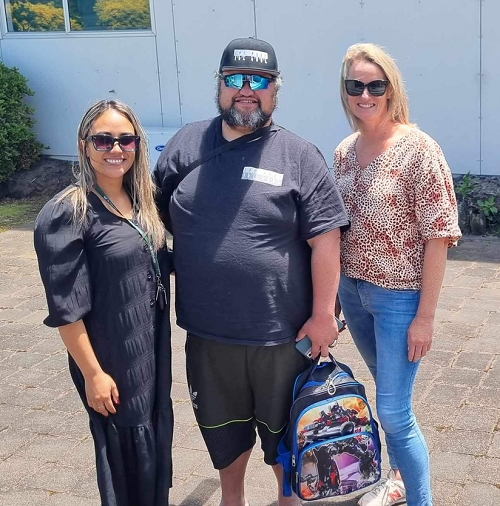A Hamilton father of three was driven to succeed for the betterment of his community as well as his family.
“I always wanted to give people the best chance in life,” says Te Mingi Elliott.
Te Mingi supports people living with schizophrenia, bipolar disorder, depression, major anxieties, psychosis, and alcoholism, many with a dual diagnosis.
The hard work and study supported his passion for helping people in the community
“My role as Tu Awhina (Support Worker) is to support whānau, or whai ora on their journey of recovery. We ensure their needs are met before we integrate them back into the community,” says Te Mingi. Whai ora are referred to his Clinical team, Te Awhi (Awhi Mai) from the Henry Rongomau Bennett mental health facility in Hamilton.
Awhi Mai provides mental health and addictions support for whānau across a range of cultures and nationalities in Waikato and Whangārei.
Te Mingi was keen to upskill to better support his whai ora. But getting qualified also promised an increase in salary, which meant a better outcome for his family.
However, studying hadn’t been a big part of his life, and he admits it wasn’t one of his strengths.

Mental Health and Addictions Graduate Te Mingi Elliott with Careerforce Apprenticeship Advisors: Alyssia Paekau (left) and Naida King (right).
When his manager, June Tauranga, encouraged him to enrol in a Careerforce | Te Pūkenga supported apprenticeship, he felt quite uneasy about the prospect, having not done any learning in a while.
So began his challenging journey.
Attending study sessions and noho marae helped Te Mingi succeed
With his main driver to succeed with the apprenticeship, being his children, the hard work and dedication soon kicked in.
Te Mingi attended almost every study session provided by Careerforce, over evenings and weekends as well as a two-day noho marae event. With support from Careerforce advisor Naida King, Alyssia Paekau, and the commitment from his employer Te Awhi, Te Mingi successfully graduated with a New Zealand Apprenticeship in Mental Health and Addiction Support.
Te Mingi says that his on-job based study has supported his passion for helping people in the community.
“Whai ora go into hospital at their most unwell and through the journey of recovery, become stabilised. Some need a bit more time before fully integrating back into the community and this is where we can step in.” says Te Mingi.
“We ensure that the community supports them and that they have a good wrap around service. Tu Whānau or whai ora may need GP appointments, dental and other social needs, and we also refer them to rental services, depending on their needs.
“We advocate on their behalf so that their financial situation is in order before moving back out into the community. For example, their benefits may have stopped and we can get that ball rolling for them.
“One of the biggest things is trying to connect our Tu whānau or whai ora with their own whānau, or friends or relatives, and help to mend the bridges that some may have burnt, on their journey.”
Prior to the apprenticeship, while employed as an Orderly/Security at Lower Hutt Hospital, Te Mingi had completed a Level 3 Health and Wellbeing qualification, also with Careerforce. But embarking on an apprenticeship was a much bigger undertaking.
“There was that feeling of uncertainty. I worried how difficult would it be for me to understand and answer the questions appropriately.
“When I’m on a roll, I can flow very well, but if I’m hitting barriers and can’t interpret questions, that’s when I struggle the most.
“The hardest thing for me was putting my thoughts onto paper.”
Plenty of support from Careerforce Apprenticeship Advisors
All Careerforce apprentices are assigned a dedicated apprenticeship advisor who provides pastoral care and support throughout their learning. Careerforce Apprenticeship Advisor Naida King was assigned to Te Mingi.
“I could not have done it if not for my advisors. Naida was very supportive.
“There were times when I would ask Naida some one-on-one stuff. I was able to talk about something and give an explanation or show my understanding to check I was correct with the answer.
“I struggled, but persevered as I wasn’t going to give in lightly. I continued to stay strong.”
One of the key things that Te Mingi took from his learning was self-reflection.
“When I first started, I didn’t like to analyse people because I felt I was being judgemental, without understanding their life journey. But in this work, in mental health, I had to start learning to analyse things.
“Have things not gone as planned or as you hope they may have? You go away from the situation and mull it over it for a bit and you come out with a different perspective.”
Careerforce apprenticeship advisor, Naida King says, “Te Mingi has worked incredibly hard, attending so many of the out of hours sessions that fellow Careerforce advisor Alyssia (Paekau) and I have run on Saturdays and Monday nights. Not only was he passionate about his own learning, but he also showed great awhi for others on their journey, making sure the times that I came in were the best fit for everyone.”
Te Mingi adds, “I do believe that if you’re eager to get it done and dusted, you should attend as many sessions as possible. I have already recommended the apprenticeship programme to my colleagues.”
More Information
For more information about the Mental Health and Addiction Support Apprenticeship, please contact Careerforce, a business division of Te Pūkenga. Eligible employers can also receive $500/mth Apprenticeship Boost payments for apprentices within their first 24 months, available until December 2024.

